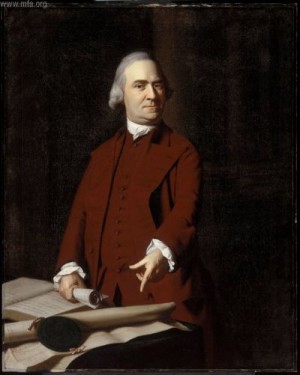[Samuel Adams to Joseph Warren]
“Philadelphia, September 25, 1774.
My Dear Sir, – I wrote you yesterday by the post. A frequent communication at this critical conjuncture is necessary. As the all-important American cause so much depends upon each colonys acting agreeably to the sentiments of the whole, it must be useful to you to know the sentiments which are entertained here of the temper and conduct of our province. Heretofore we have been accounted by many; intemperate and rash; but now we are universally applauded as cool and judicious, as well as spirited and brave. This is the character we sustain in congress: There is, however, a certain degree of jealousy in the minds of some, that we aim at a total independency, not only of the mother-country, but of the colonies too; and that, as we are a hardy and brave people, we shall in time overrun them all. However groundless this jealousy may be, it ought to be attended to, and is of weight in your deliberations on the subject of your last letter. I spent yesterday afternoon and evening with Mr. Dickinson. He is a true Bostonian. It is his opinion that, if Boston can safely remain on the defensive, the liberties of America, which that town has so nobly contended for, will be secured. The congress have, in their resolve of the 17th instant, given their sanction to the resolutions of the county of Suffolk, one of which is to act merely upon the defensive, so long as such conduct may be justified by reason and the principles of self-preservation, but no longer. They have great dependence upon your tried patience and fortitude. They suppose you mean to defend your civil constitution. They strongly recommend perseverance in a firm and temperate conduct, and give you a full pledge of their united efforts in your behalf. They have not yet come to final resolutions. It becomes them to be deliberate. I have been assured, in private conversation with individuals, that, if you should be driven to the necessity of acting in the defence of your lives or liberty, you would be justified by their constituents, and openly supported by all the means in their power; but whether they will ever be prevailed upon to think it necessary for you to set up another form of government, I very much question, for the reason I have before suggested. It is of the greatest importance, that the American opposition should be united, and that it should be conducted so as to concur with the opposition of our friends in England.
Adieu, Samuel Adams.”
Source: Samuel Adams Papers 1635-1826. In Wells and Bancroft Collection. New York: New York Public Library. Text also appears in Frothingham, Richard. 1865. Life and Times of Joseph Warren. Boston: Little, Brown, & Co., p. 377-378. The 1772 portrait of Samuel Adams is by J.S. Copley, courtesy of the Boston Museum of Fine Arts.
Commentary: Samuel Adams apprehended the critical relationship among a possible military confrontation between Patriots and the British Army, an overt push for immediate independence for which the most Massachusetts Patriots had already achieved de facto since the Worcester Convention of early September; and perceptions of New England motivations at the Continental Congress. Samuel Adams wrote to Joseph Warren via express the just previous day about the importance of nominally maintaining Massachusetts government under the pre-Intolerable Acts charter. In this letter he apprehends the wider significance of how this aspect fits into a larger picture of achieving inter-colonial solidarity. He shares this with Joseph Warren in this urgent communication.
In September of 1774 Joseph Warren began to step out from the shadow of his political mentor Samuel Adams. By the Spring of 1775, Warren’s penchant for decisive, inspiring, and improvisational leadership was on full display just as events spiraled toward war.

 Follow
Follow